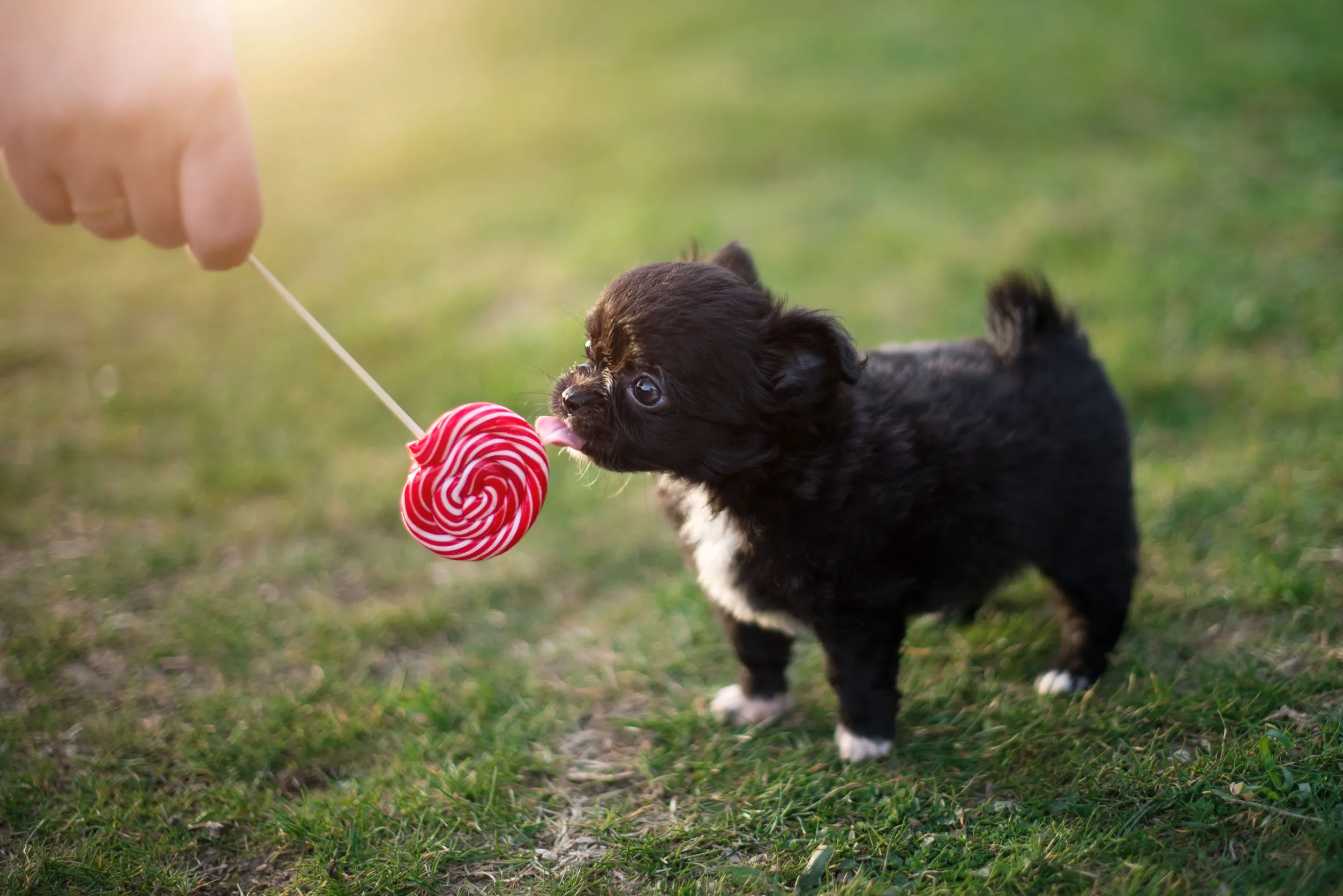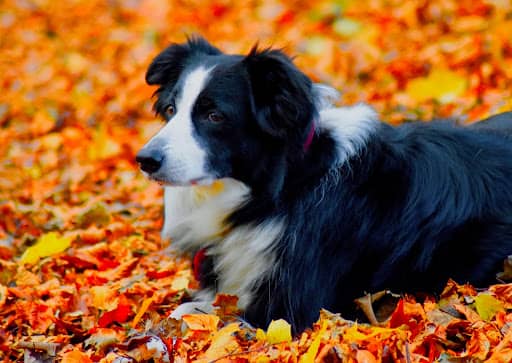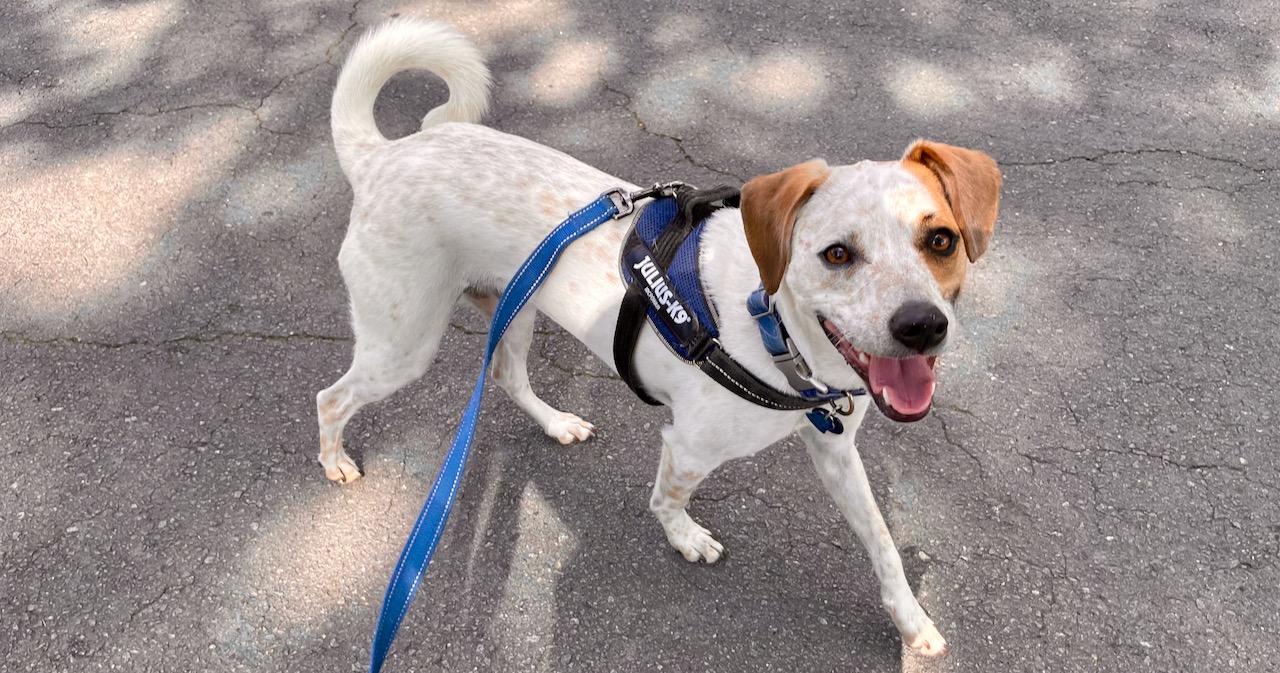Peppermint is one of the most popular scents and flavorings in foods and drinks, especially around the holiday season. It’s also used medicinally in alternative healing practices around the world. But can dogs eat peppermint? Let’s find out!
Can dogs eat peppermint?
Yes, dogs can eat the fresh (or dried) herb peppermint, as well as peppermint tea and natural peppermint oil. In fact, as well as being a tasty treat, adding the herb or tea to your dog’s diet has many benefits. However, they cannot have peppermint candies or synthetic essential oils.
Related: Candy Cane Shaped Doggie Biscuits with NO Artificial Coloring!
Benefits of peppermint for dogs
Fresh mint is rich in Vitamins A and C, as well as iron, which support healthy bones, skin, blood, and vision, as well as immune health. The leaves are also a good source of dietary fiber, which promotes healthy digestion and weight, and it is well known to soothe upset tummies.
In addition, peppermint has powerful antiviral, antimicrobial, antibacterial, and antifungal properties, so it can be used in addition to veterinary treatments for some sicknesses and infections, and may even help to alleviate arthritic pain in senior dogs.
Finally, in true minty fashion, the most common reason people want to give their dogs mint is because is a great way to freshen up stinky breath.

How to give your dog peppermint & how much to give them
If you want to give your pup fresh peppermint, limit it to a few leaves, or it could upset their stomachs. You can give them a few leaves daily if they’re struggling with bad breath, and to make it more enticing if they’re not a fan, cut them up small and mix them in with your dog’s food. Alternatively, you can buy dried peppermint that comes prepared in small pieces.
You can also include chopped-up peppermint leaves in homemade dog biscuits if your pet is in serious need of some breath freshening!
Can puppies eat peppermint?
The fresh herb is perfectly harmless to puppies over 12 weeks old and can be given to pups in very small quantities as an occasional treat in addition to a balanced diet.
Can dogs have peppermint tea?
Peppermint tea is a fine treat to give your dog and just like the leaves, it can aid digestion issues, soothe nausea during sickness, and freshen the breath. It’s free from caffeine and may even help to soothe stress and anxiety. Just make sure it’s cooled down before giving it to your dog!
If your dog is a big fan of the flavor and in serious need of some breath freshening, consider getting creative and making them a peppermint ice lolly by freezing some peppermint tea in your freezer.

Is peppermint dangerous for dogs?
The herb peppermint is not dangerous for dogs, but it can cause vomiting and diarrhea in large quantities or in dogs with sensitive stomachs. So, we wouldn’t advise giving it to dogs with particularly sensitive stomachs.
Will peppermint candy hurt dogs?
While the herb is harmless, you should not give your dog peppermint candies, candy canes, or ice creams. Not only is it too high in sugar for dogs, which can cause sugar spikes and stomach upsets in the short term, as well as tooth decay, weight gain, and diabetes in the long term.
Most peppermint candies also contain the sweetener xylitol, which is highly toxic to dogs. Even small amounts of xylitol can induce liver failure in our four-legged family members, so this is a definite no-no! Some peppermint candies also contain chocolate, which is equally toxic in slightly higher doses.
Hard candies can also damage your dog’s teeth, cause a choking hazard, and scratch or get stuck in your dog’s digestive tract if not chewed properly, which can be life-threatening. The plastic wrap of peppermint candies is also a choking hazard and a danger to your dog’s insides.

Can I use peppermint oil with my dog?
Peppermint oil is an essential oil derived from the flowers and leaves of the peppermint plant. It has been used medicinally for centuries and can provide some of the same benefits that we’ve mentioned already, but not all essential oils are the same.
If you’re going to use essential oils with your dog, they must be of a high quality; all-natural, diluted, and specifically labeled as being made for dogs to ensure no unsafe or synthetic ingredients are in the oil. In fact, many of these types of oils are used in small quantities in dog treats and products like dog toothpaste.
However, lower-quality, synthetic essential oils can contain toxic ingredients that are extremely harmful to your dog, and those that are natural but undulated are far too strong.
There are certain things you should also never do with essential oils when it comes to your dog, no matter the quality of the oil.
Can I diffuse peppermint oil for my dog?
No, your dog’s sense of smell is much, much stronger than yours, and it could make them feel sick or even have an upset stomach. The inhalation can also be potentially dangerous, and if enough droplets dry on their fur and they lick it off, they can poison themselves or even get poisoned from the absorption through the skin.
Can I use peppermint oil on my dog’s skin?
No, you should never apply essential oils to your pup’s skin, as it could cause irritation or even chemical burns, depending on the oil.
Other dangers
Owners should also be aware of the dangers of giving peppermint oil to dogs with certain health conditions, such as liver disease or kidney disease. Peppermint oil can affect these organs and make these health issues worse.
Signs of essential oil poisoning in dogs
- Difficulty breathing
- Coughing or wheezing
- Drooling
- Difficulty walking
- Lethargy
- Tremors
- Pawing at the mouth or face
- Mouth/skin redness or burns
If your dog shows any signs of poisoning, take them to your closest emergency vet as soon as possible or call the Pet Poison Helpline if you’re not sure.
Do dogs like the taste of mint?
Like humans, every dog is different. Mint is an acquired taste and the smell and taste of it can be either loved or hated by dogs.
Can dogs be allergic to peppermint?
Dogs can be allergic to almost anything, including peppermint, but it’s a pretty rare allergy. Signs of food allergies in dogs include coat changes, low energy, and tummy upsets.
If you think your dog could be allergic to peppermint, don’t give it to them and look into alternatives if you’re looking for a breath freshener.
Alternatives to peppermint
Whether you want to give your dog a herby treat or something to freshen their breath, let’s take a look at some handy alternatives.
Regular mint
Regular mint leaves are a safe and tasty alternative to peppermint leaves. And yes, there is a difference between mint and peppermint.
Parsley
Parsley is also a brilliant herbal breath freshener for dogs. Just use it sparingly, like we did in our Homemade Fresh Breath Dog Treat Recipe.

Brush your dog’s teeth
If you really want to freshen up your dog’s breath, consider brushing their teeth using a doggy toothbrush, but be sure to also use dog toothpaste, as most human toothpastes contain xylitol, which as we mentioned earlier, is highly toxic to dogs.
Dental treats
Dental treats for dogs are designed to scrape plaque from the teeth, improve your dog’s oral hygiene, and freshen their breath. If you don’t want to give your dog a commercial dental stick, try a frozen carrot.
Chew toys
Chew toys are another great way to clean your dog’s teeth. They are designed to promote saliva production and scrape the plaque from your dog’s teeth, which naturally cleans their teeth and freshens their breath.
Dental powders & drinks
If your dog isn’t into teeth cleaning, try a dental powder that is made to be mixed in with their daily meals, or a dental drink that can be added to their daily water bowl to freshen their breath.
Does your dog like peppermint leaves? Let us know in the comments below. If you’re going to give your dog peppermint, be sure to keep it restricted to the leaves or the tea, and do your research if you want to use essential oils.



